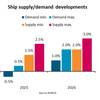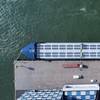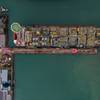The GEF/UNDP/IMO GloBallast Program, a project, executed by IMO which is aimed at preventing the spread of unwanted alien organisms in ballast water, has won the Institute of Marine Engineering, Science and Technology (IMarEST) Queen's Golden Jubilee Marine Environment Award.
The GloBallast implementation team, including the Programme Co-ordination Unit in MED here at IMO, and counterparts in the six GloBallast Pilot Countries (Brazil, China, India, Iran, South Africa and Ukraine), was selected as one of three finalists for the IMarEST award
The final “heat” was held on the evening of 1 October, when the finalists made a presentation to the judging panel and a general audience at IMarEST’s London headquarters.
The three finalists were:
GEF/UNDP/IMO Global Ballast Water Management Programme (GloBallast)
Introduced by Steve Raaymakers: Technical Adviser, Programme Co-ordination Unit, GloBallast Programme, Marine Environment Division, IMO
Development of a ballast water processing system from laboratory to pilot aboard ship to a commercial system capable of managing the full ship’s ballast
Presented by Bud Leffler: Founder, President, Chief Executive Officer and Director, Marine Environmental Partners Inc and Dr Andrew Rogerson, Professor & Director of Ocean Research Center and Nova Southeastern Graduate Programs
The development of Foul Release coating for seagoing materials
Presented by Dr Bob Townsin: Consultant and Dr Maureen Callow, Senior Research Fellow, School of Biosciences, University of Birmingham
GloBallast Programme
The problem of invasive species is largely due to the expanded trade and traffic volume over the last few decades. The effects in many areas of the world have been devastating. Quantitative data show the rate of bio-invasions is continuing to increase at an alarming rate, in many cases exponentially, and new areas are being invaded all the time. Volumes of seaborne trade continue overall to increase and the problem may not yet have reached its peak.
IMO is developing mandatory regulations to address the problem and a diplomatic Conference is scheduled to be held in February 2004 to adopt a new International Convention for the Control and Management of Ships' Ballast Water and Sediments.
The Organization has joined forces with the Global Environment Facility (GEF), the United Nations Development Programme (UNDP), individual countries and the private sector to implement the GloBallast Programme, which is an international technical co-operation programme executed by IMO, with funding from GEF, through UNDP, and with support from individual countries and the shipping industry. GloBallast activities commenced in March 2000.
The Nominee for the award was the implementation team of the GloBallast Programme, including the four-person Programme Coordination Unit at the International Maritime Organization (IMO) in London, the counterparts in the six Pilot Countries in Africa, East Asia, Eastern Europe, Middle East, South Asia and South America and other partners involved in the Program.
April 2025
 Read the Magazine
Read the Magazine

 Read the Magazine
Read the Magazine
This issue sponsored by:

Navigating the Future of the Maritime Industry
Subscribe for
Maritime Reporter E-News
Maritime Reporter E-News is the maritime industry's largest circulation and most authoritative ENews Service, delivered to your Email five times per week







